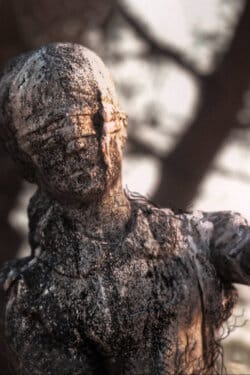

In the shadowy, pine-filled countryside of Greece, there’s an old legend known to the older locals but half forgotten and unknown to the few young people living there. The legend centres around an eerie stone statue of a little girl named Magda, hidden deep in the local dark pine forest.
Magda was the daughter of a wealthy merchant in the late 1800s, a girl with straw-colored hair and a bright, innocent smile. She loved to play with her friends in the forest, especially a peculiar game of their own invention that was a blend of hide-and-seek and statues. The rules were simple: the children would blindfold themselves, and one person would stand by a tree in the distance, reciting a playful song while the others—blindfolded and stumbling—tried to reach them. The trick was that they could only move while the song was being sung. If the seeker caught them moving when the song stopped, the person who moved lost and was out of the game. The song is said to have gone like this:
“Come here to this pine tree,
While I am not looking,
But as I turn ’round to you,
Like statues you must be unmoving,”
(repeated three times)
On that fateful day, as golden sunlight filtered through the canopy, Magda and her friends delved deeper into the woods than ever before. The song of the game echoed through the trees as Magda, giggling beneath her blindfold, stumbled forward. But fate had something darker in store. She tripped, her foot caught on an exposed root, her head striking a jagged rock, leaving her motionless on the forest floor. Her friends stood frozen, uncertain what had happened. They approached cautiously, only to find Magda lying in a pool of her own blood, pale as a white sheet.
Panic-stricken, convinced she was dead, the children ran. They left her there, alone, bleeding out in the stillness of the forest, too afraid to tell anyone what had happened. Magda’s body was found the next morning, her little fingers were curled into the dirt as if she had tried to crawl to safety. She hadn’t died instantly. She had lain there, cold and bleeding, waiting for someone to help her. No one ever did.
Her grieving parents, shattered by the loss, built a stone statue of their beloved Magda on the very spot where she had died. Some say they even buried her body beneath the stone figure, eternally marking the place of her tragic death. The statue now stands old and weathered, its surface cracked and worn. Dry vines snake through the crevices, depicting her wearing the blindfold, her hands outstretched as if forever reaching for the seeker or the help she never found.
But death, it seems, was not the end of Magda’s story.
Locals whisper that if you venture deep into the forest and dare to find Magda’s statue, you can play her game once more. The legend says that Magda’s spirit, though unseen, will join you in the game. Those who play fairly and finish the game are said to be blessed with extraordinary luck, as if rewarded by Magda for keeping her memory alive. Some even claim you can hear her faint, childlike giggles drifting through the trees as you stumble blindly through the forest.
But beware—the rules must be followed. If you start the game, it must be finished. If you cheat, leave before the game is over, or break any of the rules, you will suffer her wrath. It is said that those who break the rules leave the forest haunted and cursed forever, as if the little girl who died tragically has found a way to cling to them, her fury as strong as her desire to play.
No one knows how many have tried to play the game and failed, but those who have come back speak of nightmares, eerie coincidences, and misfortune. But if you ever find yourself in that ancient Greek forest and stumble upon a weather-worn statue of a little girl, frozen in time—remember her story. And ask yourself: are you willing to play?


Very good and such an original idea.